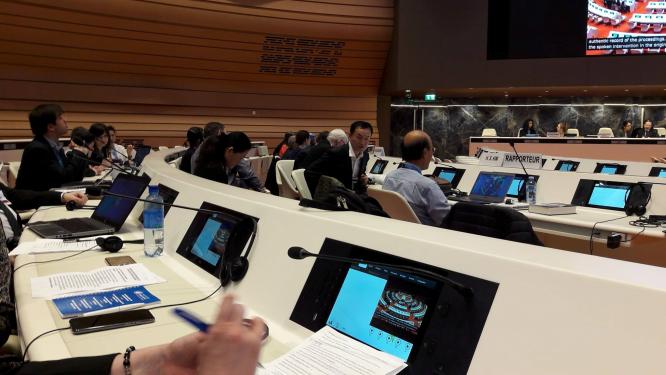UN urges Moldova to stop violence against women with disabilities and close abusive institutions
The UN Committee on the Rights of Persons with Disabilities (CRPD Committee) has criticised the practices of forced abortions, gender based violence and widespread violence in psychiatric institutions and hospitals. The experts criticised the slow pace of deinstitutionalisation which leaves thousands of people with disabilities forced to live in such settings.
 Review session of Moldova at the UN Disability Committee. © MDAC.
Review session of Moldova at the UN Disability Committee. © MDAC.
The CRPD Committee is a UN human rights body which reviews the records of countries which have ratified the UN Convention on the Rights of Persons with Disabilities (CRPD). Last month, it was Moldova’s turn.
Together with our NGO partners at the Moldovan Institute for Human Rights (IDOM), MDAC submitted information to the CRPD Committee describing a number of human rights issues faced by people with disabilities in the country, including violence and abuse against women with disabilities in institutions, guardianship and insufficient progress towards ensuring inclusion in the community. MDAC also joined a delegation of Moldovan civil society to the UN in Geneva to provide direct information to Committee members.
Gabriela Mironas, one of MDAC’s clients, joined the delegation. She spent most of her life in Moldovan psychiatric institutions, being a victim of atrocious human rights violations. She went before the Committee and told her story:
“I was abandoned by my parents at birth (…). This is how I ended up living in institutions, where my life was ruined.
(…) What I had in the institution, that was not a life. It was really bad. I was often running away, I was beaten, I was always scared. I was running away and sleeping on the streets, under fences, begging for food. People were calling the police and the police were taking me back to the institution.
At the Balti institution, where I spent 12 years, the employees would laugh at me when I said I wanted to get out. They said: where would you go, who do you think would ever need you? Who do you think would ever listen to you? (…)
In the Balti institution I was also abused many times by Stanislav Florea, a doctor who was supposed to take care of us. I got pregnant, but at 6 and a half months they forced me to have an abortion. They killed my baby, and with him I died as well. After the procedure the doctors said I can no longer have children.”
The doctor who raped Gabriela and at least 17 other women in the psychiatric institutions where she lived was sentenced to 13 years of imprisonment. An appeal in the case is on going. In the meantime, Florea continues to live as a free person, and many others who may have been involved or aware of of the abuses have escaped responsibility.
Justice and social inclusion
The CRPD Committee also scrutinised the severe problems people with disabilities experience in accessing justice. Even if abused every day, people in institutions have few, and often ineffective, complaint mechanisms they can use. Allegations are rarely investigated, abusers are rarely punished and few victims ever receive compensation or redress.
Since ratifying the CRPD and even before that, the Government of Moldova has declared repeatedly it plans to close down institutions and take steps to ensure that people with disabilities can get back their freedom and find a place in communities. This promise was reiterated before the CRPD Committee, and in recent years the country has begun adopting policies on the development of community-based services, including mental health services. Yet, the pace of change remains slow with just some tens of people having been moved to the community, and over 2,000 still having no other option but to live in institutions.
Having considered the information, the CRPD Committee recommended that the Government of Moldova:
- Prevent, investigate, prosecute and provide redress to victims of human rights violations;
- Protect persons with disabilities who remain institutionalised from forced, inhuman or degrading treatment or punishment and prohibit all such acts;
- Develop an effective investigation and monitoring system to prevent and investigate all forms of inhuman or degrading treatment or punishment;
- Strengthen efforts to develop community-based services to advance deinstitutionalisation, particularly for women with psychosocial and/or intellectual disabilities;
- Execute, without delay, an action plan for the implementation of reforms on deinstitutionalisation including a deadline and timelines for closing all remaining institutions;
- Monitor residential institutions, in close collaboration with organisations of persons with disabilities, in the interim period.
The CRPD Committee also told the Government of Moldova to report back within one year on measures it is taking to tackle high levels of violence in institutions.
MDAC welcomes these recommendations and urges the Government to take swift action in helping people with disabilities to move from institutions to the community. The Government must immediately stop violence and abuse against those currently in institutions and make sure allegations of abuse are investigated, perpetrators are punished and victims receive redress and rehabilitation.

